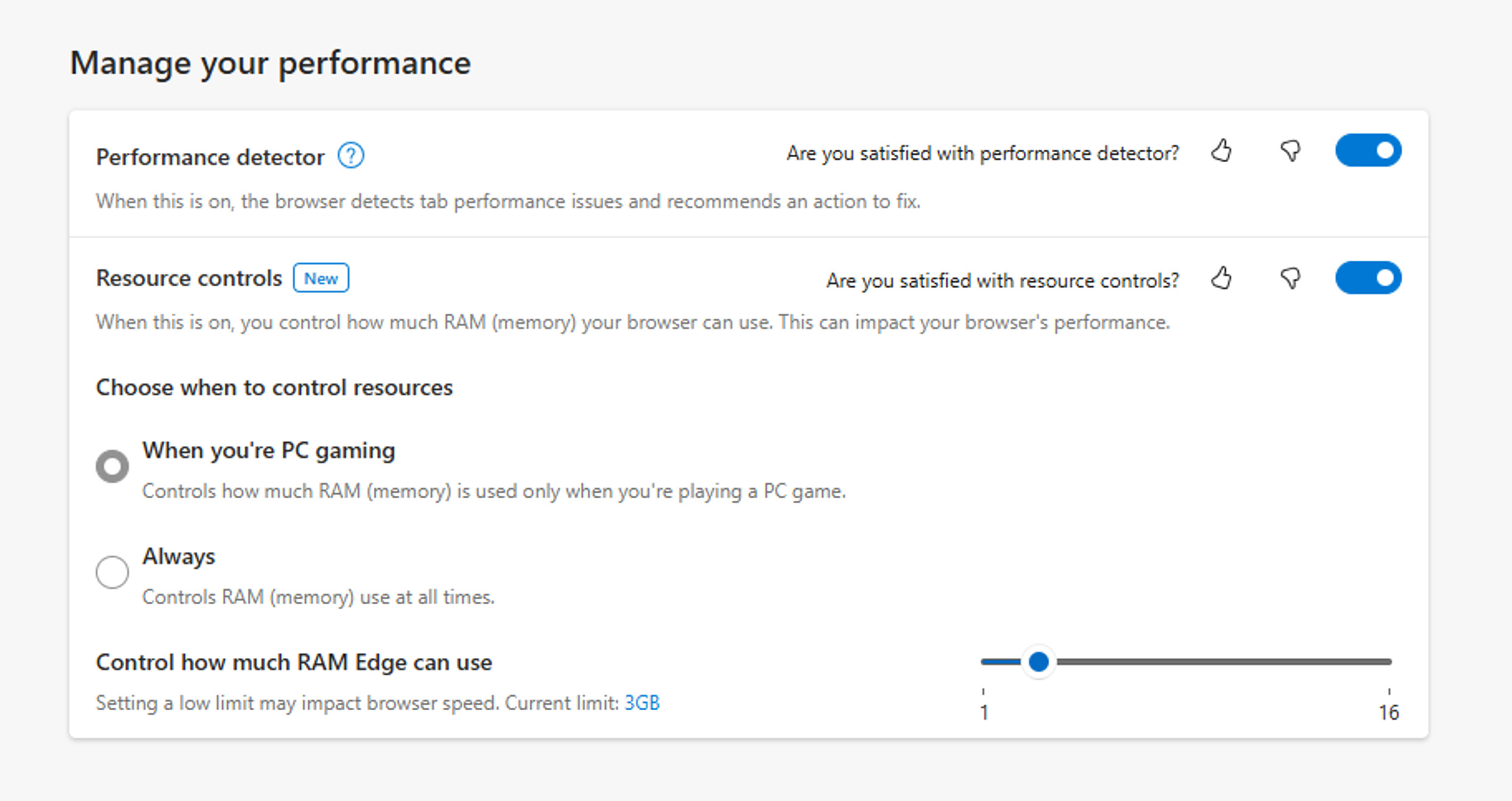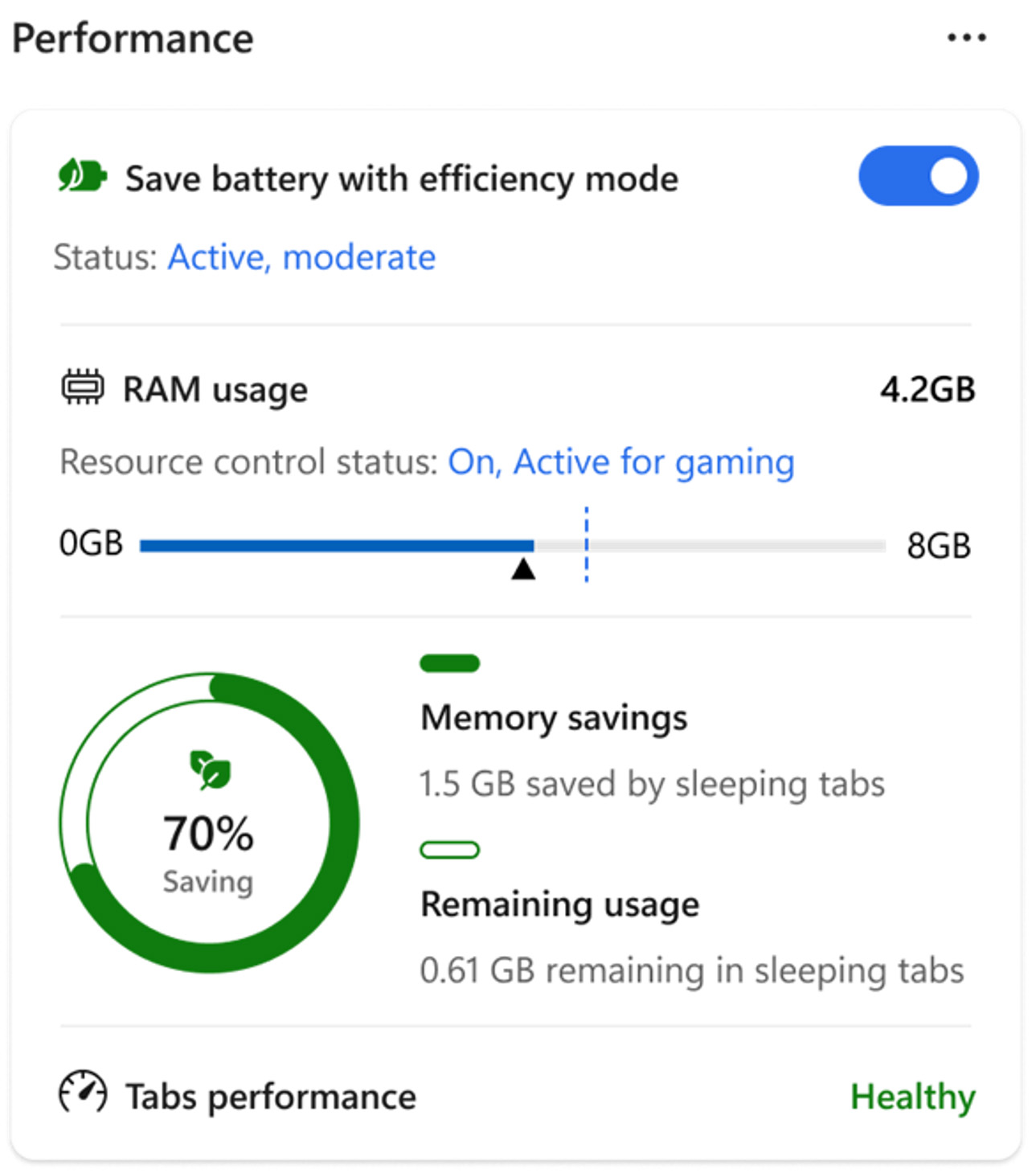Microsoft's new RAM limiter for Edge browser makes its way into latest beta version
Edge's memory resource management tool skips the dev channel, jumping directly to beta release

Microsoft's RAM limiter for Edge is now available in the browser's latest 125 beta release. The new feature gives users complete control over how much RAM Edge consumes to improve performance or boost battery life.
Edge's RAM limiter was introduced over a month ago in the Microsoft Edge Canary channel. Since then, the feature has been moved to the beta channel as Microsoft irons out the last few bugs before pushing it out to all Edge users.


Nothing has changed since we last looked at Edges RAM limiter when it was still in the Canary channel. The new memory management utility is the first tool in Edge's efficiency settings menu that gives users direct manual control over the browser's resource consumption. When enabled, the RAM limiter can be applied while gaming or activated continuously to keep Edge's memory footprint low.
Memory limits are applied with a slider that users can tweak to their liking. The RAM slider starts at 1GB and extends to the system's physical memory capacity in 1GB increments. Additionally, Microsoft has also added a RAM consumption monitoring tool to Edge's "Browser Essentials" sidebar so users can quickly view Edge's memory consumption at any moment.
Obviously, reducing Edge's memory accessibility can have performance repercussions, so users will want to ensure that they don't set a capacity amount that is too low, which will make Edge run at a snail's pace.
The new RAM limiter and Microsoft's existing performance-enhancing features make Edge one of the most flexible browsers regarding a browser's performance footprint. Edge can consume quite a lot of memory and CPU resources (similar to Chrome), but when tuned with the RAM limiter and Microsoft's plethora of efficiency settings, Edge's large footprint can be greatly reduced. We hope some of these features make their way to Chrome one day since Google's browser is notorious for consuming loads of memory. The only other browser we know of employing a RAM limiter is the Opera GX browser.
The new RAM limiter won't be that useful for high-end machines with loads of memory to spare, but it will benefit low-end machines like 8GB laptops and desktops where every gigabyte counts. If Microsoft continues its speedy development pace, we wouldn't be surprised if the RAM limiter makes its way to a live release next month.
Get Tom's Hardware's best news and in-depth reviews, straight to your inbox.

Aaron Klotz is a contributing writer for Tom’s Hardware, covering news related to computer hardware such as CPUs, and graphics cards.
-
YouFilthyHippo Any excess RAM that is needed will be deffered to pagefile. If paging is disabled, either tabs will cease function, until clicked on, at which point the page will have to refresh, possibly losing an open session that relied on constant connectivity. People are going to start getting pissed off at edge when their browser stops working properly, because 99.999999999% of end users are not computer literate. Then they will all switch to chrome because at least it works properly, or call out microsoft for not telling people what limiting RAM actually does. Microsoft should probably put a disclaimer on there explaining how all this worksReply -
Notton If this really increases battery life, I want to see some benchmarks.Reply
Because my instinctive guess is you want the browser using 4~8GB out of the 2x8GB RAM configuration for best battery life.
And that going down to 1GB usage, 2x4GB or 2x16GB configuration would be worse for battery life. -
brandonjclark Reply
I'm pretty sure Microsoft has baked in a claim on memory that is needed to retain session state regardless of how much you limit it to.YouFilthyHippo said:Any excess RAM that is needed will be deffered to pagefile. If paging is disabled, either tabs will cease function, until clicked on, at which point the page will have to refresh, possibly losing an open session that relied on constant connectivity. People are going to start getting pissed off at edge when their browser stops working properly, because 99.999999999% of end users are not computer literate. Then they will all switch to chrome because at least it works properly, or call out microsoft for not telling people what limiting RAM actually does. Microsoft should probably put a disclaimer on there explaining how all this works -
YouFilthyHippo Reply
Then people will claim that the limiter doesn't actually do anything. Hey, why is edge using more RAM? Oh. I guess this limiter doesn't actually do anything and is just basically a liebrandonjclark said:I'm pretty sure Microsoft has baked in a claim on memory that is needed to retain session state regardless of how much you limit it to. -
Alvar "Miles" Udell A feature that shouldn't be needed in 2024, and a feature that's only going to cause more Edge hate from "experts" who set it at 1-2GB and it causes problems.Reply
it will benefit low-end machines like 8GB laptops and desktops where every gigabyte counts.
You mean like the kind of machines TomsHardware advertises as "deals" and advises people to buy? -
jeremyj_83 The better question is besides being the initial browser to use to download your favorite browser why would anyone use Edge.Reply